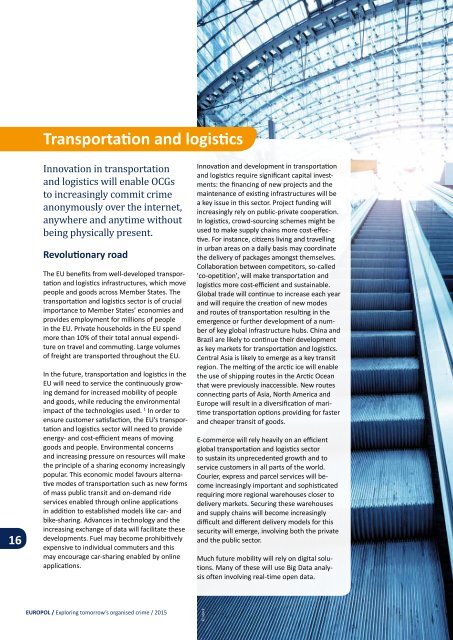eu-europol-org-crime-report
eu-europol-org-crime-report
eu-europol-org-crime-report
Create successful ePaper yourself
Turn your PDF publications into a flip-book with our unique Google optimized e-Paper software.
Transportation and logistics<br />
16<br />
Innovation in transportation<br />
and logistics will enable OCGs<br />
to increasingly commit <strong>crime</strong><br />
anonymously over the internet,<br />
anywhere and anytime without<br />
being physically present.<br />
Revolutionary road<br />
The EU benefits from well-developed transportation<br />
and logistics infrastructures, which move<br />
people and goods across Member States. The<br />
transportation and logistics sector is of crucial<br />
importance to Member States’ economies and<br />
provides employment for millions of people<br />
in the EU. Private households in the EU spend<br />
more than 10% of their total annual expenditure<br />
on travel and commuting. Large volumes<br />
of freight are transported throughout the EU.<br />
In the future, transportation and logistics in the<br />
EU will need to service the continuously growing<br />
demand for increased mobility of people<br />
and goods, while reducing the environmental<br />
impact of the technologies used. 1 In order to<br />
ensure customer satisfaction, the EU’s transportation<br />
and logistics sector will need to provide<br />
energy- and cost-efficient means of moving<br />
goods and people. Environmental concerns<br />
and increasing pressure on resources will make<br />
the principle of a sharing economy increasingly<br />
popular. This economic model favours alternative<br />
modes of transportation such as new forms<br />
of mass public transit and on-demand ride<br />
services enabled through online applications<br />
in addition to established models like car- and<br />
bike-sharing. Advances in technology and the<br />
increasing exchange of data will facilitate these<br />
developments. Fuel may become prohibitively<br />
expensive to individual commuters and this<br />
may encourage car-sharing enabled by online<br />
applications.<br />
Innovation and development in transportation<br />
and logistics require significant capital investments:<br />
the financing of new projects and the<br />
maintenance of existing infrastructures will be<br />
a key issue in this sector. Project funding will<br />
increasingly rely on public-private cooperation.<br />
In logistics, crowd-sourcing schemes might be<br />
used to make supply chains more cost-effective.<br />
For instance, citizens living and travelling<br />
in urban areas on a daily basis may coordinate<br />
the delivery of packages amongst themselves.<br />
Collaboration between competitors, so-called<br />
'co-opetition', will make transportation and<br />
logistics more cost-efficient and sustainable.<br />
Global trade will continue to increase each year<br />
and will require the creation of new modes<br />
and routes of transportation resulting in the<br />
emergence or further development of a number<br />
of key global infrastructure hubs. China and<br />
Brazil are likely to continue their development<br />
as key markets for transportation and logistics.<br />
Central Asia is likely to emerge as a key transit<br />
region. The melting of the arctic ice will enable<br />
the use of shipping routes in the Arctic Ocean<br />
that were previously inaccessible. New routes<br />
connecting parts of Asia, North America and<br />
Europe will result in a diversification of maritime<br />
transportation options providing for faster<br />
and cheaper transit of goods.<br />
E-commerce will rely heavily on an efficient<br />
global transportation and logistics sector<br />
to sustain its unprecedented growth and to<br />
service customers in all parts of the world.<br />
Courier, express and parcel services will become<br />
increasingly important and sophisticated<br />
requiring more regional warehouses closer to<br />
delivery markets. Securing these warehouses<br />
and supply chains will become increasingly<br />
difficult and different delivery models for this<br />
security will emerge, involving both the private<br />
and the public sector.<br />
Much future mobility will rely on digital solutions.<br />
Many of these will use Big Data analysis<br />
often involving real-time open data.<br />
EUROPOL / Exploring tomorrow’s <strong>org</strong>anised <strong>crime</strong> / 2015<br />
© istock


